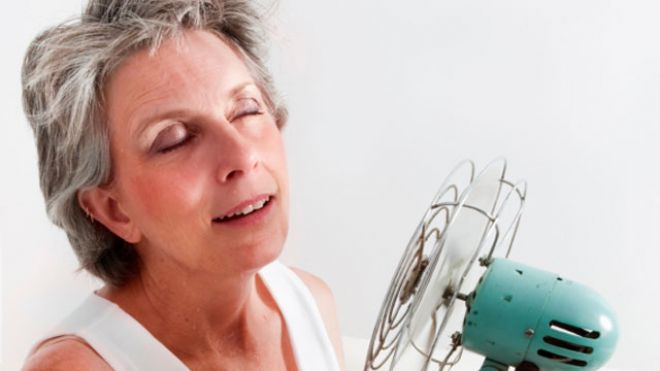
Keep Your Bedroom Cool
You may want to experiment to see what temperature works best for you. Generally, keeping your bedroom at sixty-eight degrees or less will be sufficient to keep you cool throughout the night. Keep in mind that comfortable, cozy blankets can help you adjust to changing temperature needs.
Dress In Layers
Like adjusting the warmth and weight of your blankets for optimal comfort, dressing in layers (from none to full-fledged pajamas) will help you adjust if you deal with changes during the night. Also, be aware of the texture of your sleepwear; your skin may be more sensitive during your menopausal transition.
Tweak Your Daily Routine
Fine-tuning your level and type of activity during the day will help you sleep more easily at night. If possible, confine your most intense physical and mental activity to the morning and early afternoon hours, and wind down gradually as you approach bedtime. This will help stabilize cortisol levels so you’re not as alert when night comes.
Optimize Your Exercise
Speaking of cortisol, it’s important during perimenopause, menopause, and beyond to be keenly aware of the level of stress you perceive when you exercise. Sufficient intensity increases your metabolism for optimal fat burning. Overdoing it causes stress hormones (including cortisol) to go into overdrive, causing increased feelings of stress, and triggering more hot flashes.
See Your Health Practitioner
It’s vitally important for you to establish and cultivate a trusting relationship with a health practitioner during this time. Both allopathic and holistic approaches to dealing with the symptoms of menopause are continuously changing as new research comes in. Chances are, a few well-chosen interventions will make a powerful impact on your well-being.
Prepare for Sleep
Limit your screen use as you get ready for bed. Take a warm (not too hot) shower or bath to soothe your body, mind, and spirit. Turn the lights down throughout your dwelling. Incorporate relaxing scents such as vanilla, cedar, and lavender into your evening. Give yourself the message that the day is over. Avoid activities that inflame your thoughts or emotions.
Incorporate Mindfulness
The practice of mindfulness can be incorporated throughout your day. Focus on breathing slowly, feeling the rise and fall of your abdomen. Consider bringing meditation and prayer into your morning routine; preferences play a big role here, so find out what works best for you. Mindful practices such as yoga, and tai chi help to calm your body down and circumvent the fight-or-flight response. When turning out the light, read soothing material and say a prayer or affirmation if it seems appropriate.
Eat Wisely
Cooling foods (without too many spices) can help calm the effect of hot flashes. Also, find out the right amount and type of carbohydrates that will help you settle down and relax before bedtime. Low-glycemic carbs provide a soothing effect but don’t spike your blood sugar.
Handling Sleep Cycle Interruptions
While eight hours per night on average is ideal for both genders, it turns out that men are harder hit by periods of deprivation.5 Lack of sleep causes work performance to suffer more for men than for women, and men recover less quickly from lack of sleep than women do. On the other hand, women’s shorter cycles mean they are more likely to have a dip in energy at night, which could help explain why there’s an increased risk of work-related injuries in female shift workers.
Of course, it is possible to learn how to re-train your inner clock to help you feel more awake or sleepy at different parts of the day depending on your lifestyle needs. But left to its own devices, the body’s natural rhythms make it more likely that if you are a man, you will be a night owl, and for women, an early bird.
Getting better sleep while experiencing hot flashes requires a gentle, holistic approach to self-care. Give these simple tips a try to feel more serene, cool, and tranquil. Alaska Sleep Clinic is the most comprehensive sleep lab company in Alaska. Call us today for your free sleep assessment.











